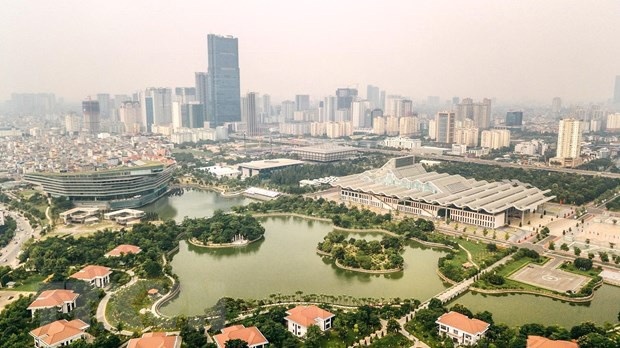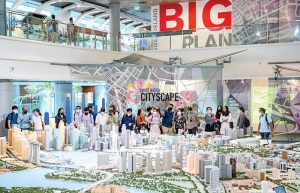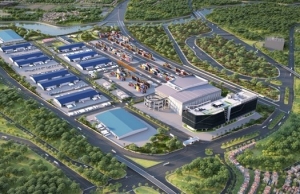By 2045, Vietnam wants to have five metropolises of international stature
 |
| The urban area of Hanoi. Photo: Thanh Dat/VNA |
Tran Quoc Thai, director of the Urban Development Agency within the Ministry of Construction, stated on November 16 at the seminar “Policies for Urban Development in Vietnam” that one of the major groups of solutions identified in this resolution is to improve policies and procedures to facilitate the urbanisation, planning, construction, management, and sustainable urban development processes.
At the seminar, the National Assembly Law Committee revealed that Vietnam has more than 860 metropolitan areas, and its urbanisation rate is over 40 per cent. The urban economy has risen at a rapid pace, contributing more than 70 per cent of Vietnam's GDP, with the proportion predicted to reach 85 per cent by 2030.
According to a significant number of planners and architects attending the seminar, rapid urbanisation, rising income societal inequalities between rural and urban areas, informal expansion, a lack of basic infrastructure and services, and a shortage of affordable housing have resulted in a variety of problems.
Dr. Nguyen Quang, deputy director of UN-Habitat, said that the complex social issues developing in urban areas demand “a larger strategy, more vertical and horizontal coordination, and relationships to innovation.”
Quang said, “Urbanisation and sustainable urban growth do not occur by chance, but by strategy.” The national urban policy should prioritise “practical priorities” such as the formulation and construction of a sustainable urban framework in both form and density via a compact urban model, the connection of cities via transport corridors, and the promotion of centralised production to take advantage of economies of scale.
The urban policy promotes intersectoral policy coherence regarding cities through the articulation of shared development visions and objectives. The urban policy should play a significant role in national development policies and goals. “In particular, a human rights-based approach, social protection measures, and excellent multi-level governance with an emphasis on participation and inclusion are required,” Quang said.
According to Quang, if Vietnam is to establish cities of international stature, the national urban policy must “decentralise more explicitly to local authorities” in urban planning/management and provide circumstances for the creation of efficient instruments to govern urban growth.
Vietnam has implemented several efforts to address environmental issues and enhance the urban infrastructure for many years. Herve Conan, head of the French Development Agency in Vietnam, said on October 22 while working with Nguyen Thanh Nghi, Minister of Construction, that urban management and development connected with the endurance and adaptability of cities to climate change offer many issues in Vietnam.
According to Conan, Vietnam is one of the most vulnerable nations to the effects of climate change owing to its geographical characteristics, with frequent droughts, floods, and coastline retreats increasing its susceptibility.
 | Building cities fit for human needs Building liveable and smart cities can only come from the backing of citizens as well as government master plans, a major conference in Singapore heard last week. |
 | More green property trends incoming Vietnam is one of the key markets for Singaporean investors who are interested in green real estate, smart cities, and high-tech logistics. |
 | New data centres popping up in Vietnam’s major cities The unveiling of new data centre plans in Vietnam is increasing rapidly, with the entry of a series of international and domestic corporations claiming to be building the biggest and best in-demand facilities. |
What the stars mean:
★ Poor ★ ★ Promising ★★★ Good ★★★★ Very good ★★★★★ Exceptional
Related Contents
Latest News
More News
- CEO Group breaks ground on first industrial park in Haiphong Free Trade Zone (January 15, 2026 | 15:47)
- BRIGHTPARK Entertainment Complex opens in Ninh Binh (January 12, 2026 | 14:27)
- Ho Chi Minh City's industrial parks top $5.3 billion investment in 2025 (January 06, 2026 | 08:38)
- Why Vietnam must build a global strategy for its construction industry (December 31, 2025 | 18:57)
- Housing operations must be effective (December 29, 2025 | 10:00)
- Developers that optimise costs will win out in green transition (December 29, 2025 | 09:37)
- Vietnam charts path to mature smart cities with AI at the core (December 26, 2025 | 16:10)
- Three-way partnership unveiled to ease financing at Hong Hac City (December 24, 2025 | 14:13)
- JustCo expands business into Vietnam (December 22, 2025 | 17:58)
- Sun Group breaks ground on $2 billion Van Don casino complex (December 19, 2025 | 18:14)

 Tag:
Tag:





















 Mobile Version
Mobile Version